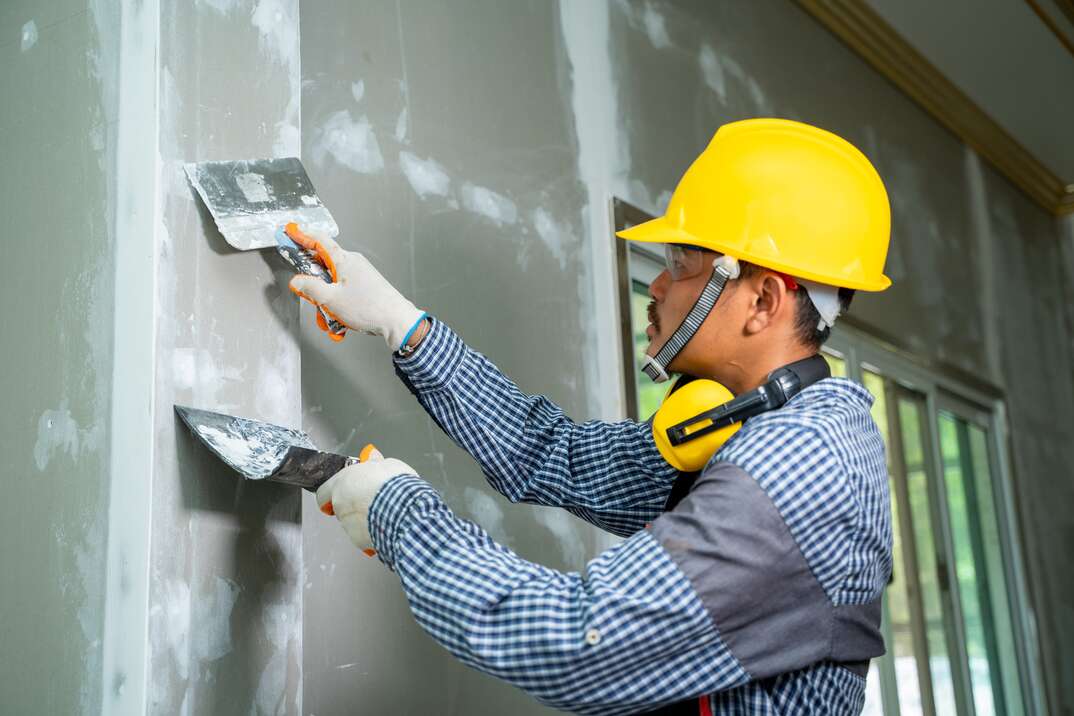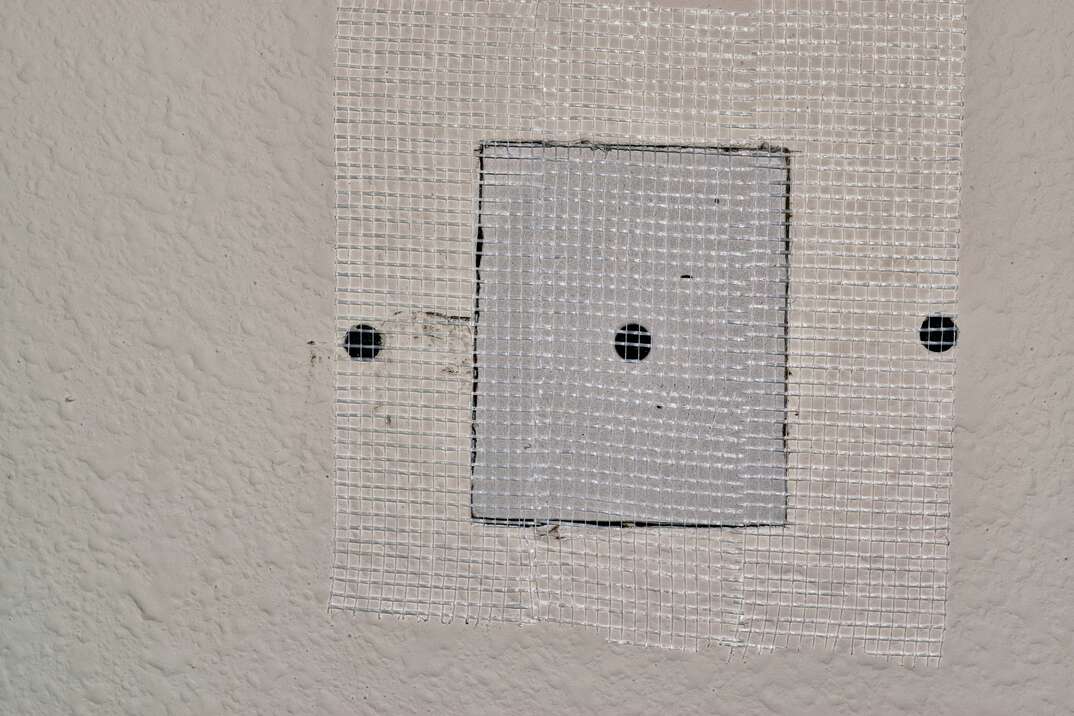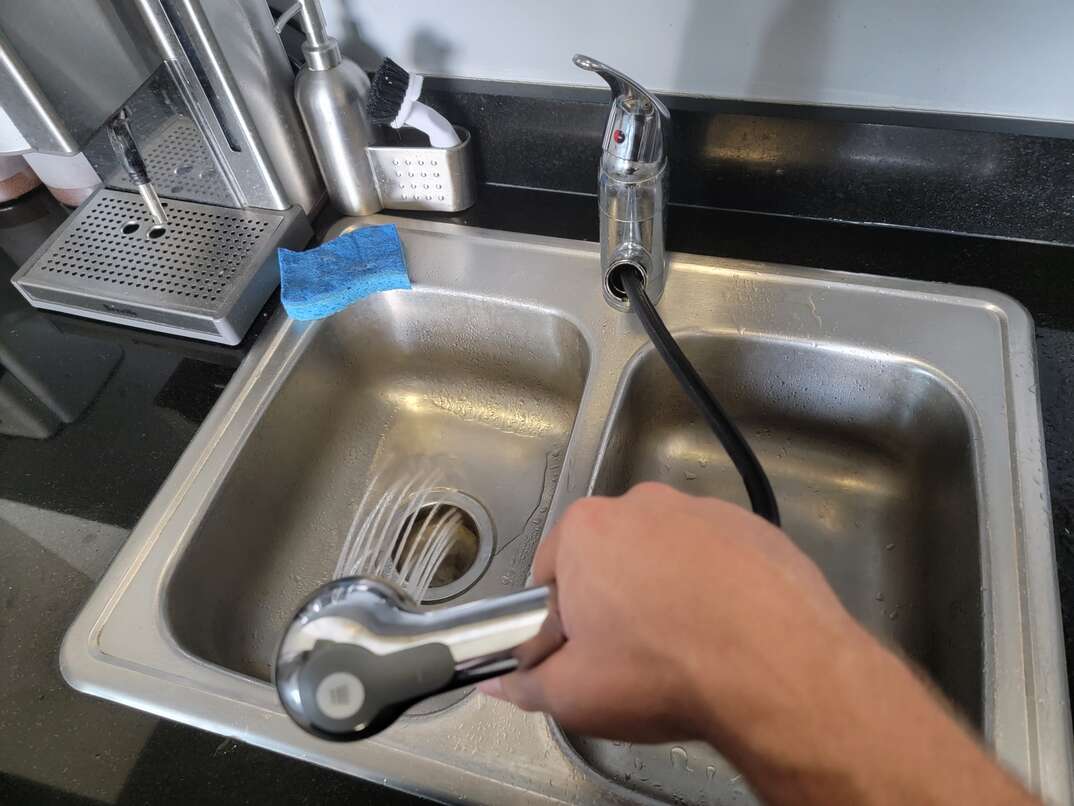How to Fix a Large Hole in Your Drywall

Fixing a Large Hole in the Wall at a Glance
- Tools & Materials: Drywall sandpaper, saw, screwdriver, utility knife, paintbrush, goggles, dust mask, screws, drywall tape, joint compound, sheetrock, plywood backing strips
- Step 1: Cut around hole
- Step 2: Screw in backing strips
- Step 3: Install new drywall
- Step 4: Cover seams
- Step 5: Sand and finish
There's nothing worse than accidentally damaging your home's drywall. Big holes are a big problem; you can’t just hang a piece of art over them and forget about them. Any accidental impact, such as opening the door too roughly, can create unsightly damage to your walls and cause additional cracks if you don't repair it quickly enough. If the hole is large, you may be wondering whether you'll have to shell out a small fortune to have it repaired.
This May Also Interest You: How to Fix Nail Holes in Walls: A 7-Step Guide
Thankfully, even large holes can be a fairly simple DIY repair. The following guide explains how to fix a large hole in the wall.
What Would Be Considered a Large Hole in Drywall?
Small drywall holes are easy to repair by covering them with drywall tape or a patch, but you'll need to follow some extra steps for larger openings. Any hole with a diameter greater than 6 to 8 inches is too large for taping or patching, so you'll need to follow the steps below explaining how to repair a large hole in the wall.
Is Fixing a Large Hole in the Wall a Job That a Novice DIYer Can Do?
While fixing a large hole in the wall may look like a daunting repair job, it's actually straightforward enough for even beginners to attempt. As long as you read the instructions for how to repair a large hole in the wall carefully and invest in the right equipment and materials, you should find it reasonably easy. However, if the hole is huge or you're worried about surrounding electrical wires, plumbing or extensive cracking, it may be better to call a professional.
What Causes Large Holes in Drywall or Sheetrock?
Any forceful impact can make a large hole in drywall, and the larger the object, the bigger the hole. One of the most common causes is door handle damage when someone opens a door too hard or it blows open in the wind. This causes the handle to smash into the wall, potentially leaving a significant crevice.
Accidentally banging your drywall with furniture or other large objects could also leave you with a large hole to fix. Energetic kids throwing toys around are often the culprits when it comes to damaged drywall.
Tools and Materials
You'll need to gather a few materials or tools before you can start repairing a large hole in the wall. When you're selecting a piece of drywall to fill the missing section, make sure it's the same thickness as the surrounding drywall. Depending on the size of the hole, you may be able to save some money by picking up a piece of scrap offcut from a DIY store instead of purchasing an entire sheet.
You will need:
- Drywall sandpaper
- Saw
- Screwdriver
- Utility knife
- Paintbrush
- Goggles and dust mask
- Screws
- Drywall tape
- Joint compound
- Replacement drywall piece
- Plywood backing strips
What Are the Steps to Fix a Large Hole in Drywall?
Before you start the repair, lay some protective sheets over any carpets and surrounding furniture and make sure you're wearing personal protective equipment. Fixing drywall holes is a dusty business, and you don't want to inhale any particles or end up with a big mess to clean up.
Step 1: Cut Around the Hole
It's far more challenging to replace damaged drywall if the hole is an irregular shape. You can make your life a lot easier by drawing a rectangular shape around the hole and cutting it out using a saw. It's reasonably straightforward to measure the replacement drywall piece from there.
Don't cut any drywall away without checking behind it for wires or pipes. Otherwise, you could cause damage to your plumbing or electrical system and end up with a far more costly repair on your hands.
Step 2: Screw in the Backing Strips
You'll need to screw two plywood strips into the existing drywall to hold the repair patch. Install the plywood along two parallel edges; it doesn't matter whether you place them vertically or horizontally.
Place the plywood strip behind the edge of the hole, leaving half of its width still visible. Secure it in place using drywall screws every 6 inches or so.
More Related Articles:
- How Much Does Drywall Cost?
- How to Finish Drywall: Taping, Mudding and Sanding
- How to Hang Drywall: A 7-Step Overview
- Walls Looking Worse for Wear? Follow This 5-Step Wall-Washing Guide
- Holey Door Damage! How to Repair a Hole in Your Door
Step 3: Install the New Drywall
Measure the size of your rectangular hole and cut out a piece of replacement drywall to match. Keep the gap between the repair patch and the edge of the hole as small as possible, but don't worry about creating a perfectly tight fit.
Once you're happy with the fit and placement of your repair piece, screw it securely to the backing strips along the edge of the hole.
Step 4: Cover the Seams
Cover the seams between the repair patch and the hole edge with drywall tape, allowing some overlap at the corners. Smooth the tape down carefully with your fingers to make sure that it lies perfectly flat.
Next, spread a thin layer of joint compound along the seams and leave it to dry out completely. Once it's dry, remove any protruding lumps. Then, apply three more layers of the compound, allowing each layer to dry thoroughly before adding the next. Finally, use a drywall knife to feather the edges so that they blend smoothly into the drywall surface.
Step 5: Sand and Finish
To make your repair virtually invisible, sand the dried compound to create a smooth surface. Work slowly, taking care not to over-sand the compound and expose the join. Once you're happy with the surface, you can prime and paint it to match the surrounding wall.
How Long Does It Take to Fix a Large Hole in the Wall and How Much Does It Cost?
Fixing a large hole in the wall is a relatively quick job and should only take a couple of hours of labor. However, bear in mind that you'll need to allow each layer of compound to dry thoroughly in between coats.
According to Drywall Price Guide, the materials and equipment required to fix a drywall hole cost $40 to 80, assuming you don't already own any of it. If you do the job yourself, it's a pretty cheap fix.



